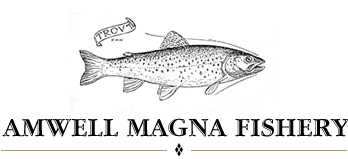Amwell Magna Fishery has a long and fascinating history. Izaak Walton fished the River Lea near Amwell Hill in the seventeenth century and he gives a vivid account of the time he spent here in The Compleat Angler. We know little about the river and its fishing during the 1700s, but by the early nineteenth century records show that Amwell Magna was a mixed fishery of some renown, considered to be the best water on the Lea.
THE MODERN ERA
The Fishery as we know it today began in 1831 when it was leased by three gentlemen from London who were also founding members of the famous Houghton Club on the River Test. Although the Houghton Club was formed in 1822 and thus predates Amwell Magna by several years, there was a break in the Houghton Club’s continuity of tenure on the Test, and for this reason Amwell Magna can justifiably claim to be the oldest angling club in Britain still fishing the same water.
For most of its history Amwell Magna has been a mixed fishery. The gentlemen anglers of the Victorian era were more interested in catching pike and other coarse fish than in catching trout, though trout were present in good numbers. The balance shifted in favour of fishing for trout during the later Victorian period, and fly fishing became the preferred method as the influence of F. M. Halford increased. It was in the years between the turn of the century and the Great War that the club first began to enforce a fly-only rule for trout. Present day members continue to fish single upstream fly; there is however no dry fly code and nymphing is regarded as being every bit as skillful as fishing the dry fly.
THE FUTURE
The Lea today is a very different river from the one that Walton fished. Changes to the Lee Navigation have reduced the volume of water, resulting in lower flows and a narrowing of the banks. The river is also now bounded on one side by a lake and nature reserve, created when nearby gravel extraction ended and the pits were flooded by water from Amwell Springs. The Amwell marshes and water meadows known to Walton are now an internationally important wildlife sanctuary, managed by the Herts & Middlesex Wildlife Trust.
The essential element of any successful club is the commitment of its members. In earlier times the membership of Amwell Magna Fishery was exclusively limited to the upper strata of society – the wealthy and influential – and included many eminent individuals. Local people were excluded as a matter of course, but in these more meritocratic times the members come from all walks of life and the only requirement is a knowledge of and a love for flyfishing.
What the future holds for Amwell Magna is of course uncertain; but we can safely assume that climate change, creeping urbanisation and ever-depleting water supplies will play their part. Although the Fishery has survived near-death experiences in the past and bounced back, we are in no way complacent. We are working hard to ensure that the centuries-old traditions of the club endure, so that future generations of flyfishers can continue to delight in the haven of peace in a troubled world that is Amwell Magna Fishery.



